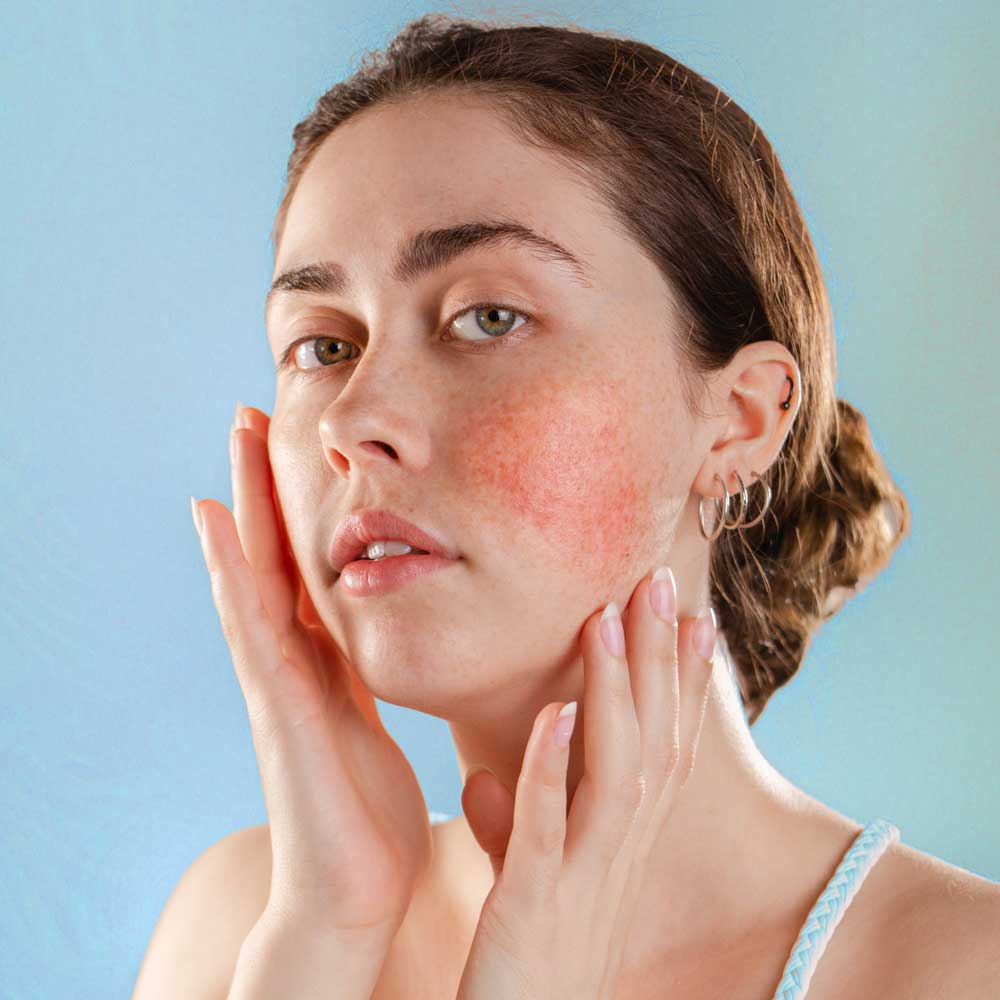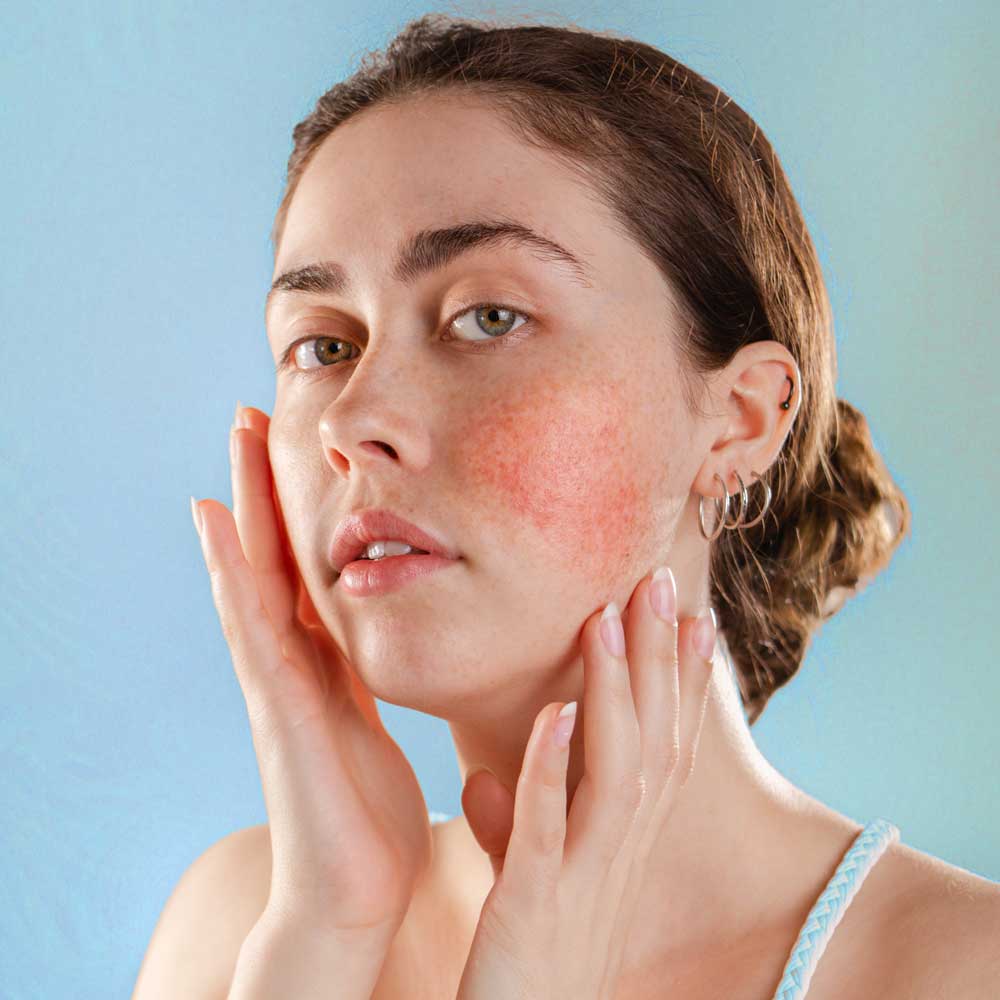If you have sensitive skin, you know the drill: careful ingredient research before trying any new products, constant vigilance for signs of irritation and being gentle with your skin at all times. It can be a lot to keep track of, but don't worry - we're here to help. In this post, we'll go over everything you need to know about irritated skin, from how to identify it to how to care for it. By the end, you'll be an expert on your skin and ready to take on the world!
What is sensitive skin?
Skin sensitivity comes in all kinds of shapes, sizes and types. For some, it's very mild, while for others it's severe. While there is no gold standard definition of sensitive skin, it typically includes symptoms like redness/flushing, itching, burning or stinging sensations when exposed to certain things like strong chemicals or even mild irritants like cold air or water.
Sensitive skin types
The most common types of skin sensitivity include:
- dry skin, which can be caused by lifestyle factors such as low-humidity environments, poor skincare and dehydration;
- rosacea-prone skin that often feels hot and is marked by patchiness and inflammation;
- reactive skin which can flare up into allergic contact dermatitis when exposed to contact irritants such as wool or certain fur fabrics.
- naturally sensitive skin which can be caused by genetics, where the skin barrier is on average not as strong
In any case, understanding your specific type of sensitive skin can help you better manage the situation over time.
Tell me the difference between sensitive skin and sensitised skin?
Sensitive skin and sensitised skin may sound like they have a similar meaning, but there is an important distinction between the two.
Sensitive skin refers to skin that is naturally hypersensitive, with an increased risk of reactions when coming into contact with potential irritants or allergens; this type of skin generally tends to be thin, delicate, and slow to repair itself.
On the other hand, sensitised skin has become sensitised due to external factors such as products that are too harsh, environmental aggressors like pollution and sun damage, or even stress. As a result, sensitivity can be seen as an “overreaction” of the barrier response, where protective cells produce excessive amounts of inflammation to protect the skin from further injury.
Whether your skin is naturally sensitive or sensitized from external factors being aware of the difference can help you take better care of it.
Are you sensitive? How can you tell if you have sensitive skin?
Having sensitive irritated skin certainly isn't something to be ashamed of - in fact, it's the opposite! Over 50% of the population knows how uncomfortable and even painful having sensitive skin can be, which is why solutions are everywhere.
Whether you need to opt for some gentle skincare products, scout out those labelled hypoallergenic, or just switch up the way you shower or wash your face every day, there's a fix that works for you out there. Even if it means doing a bit more research than someone who doesn't have sensitive skin, don't be afraid to take the time and energy necessary - your skin will thank you!
What causes sensitive skin?
If you have ever had a skin reaction or you're conscious of being extra tender with your skincare regimen, sensitive skin could be the culprit. It's pretty common and can be caused by a variety of things - like genetics, environmental factors, and even certain products.
Certain Environmental factors
Sensitive irritated skin can be caused by a variety of factors, such as extreme temperature changes, or too much sun exposure.
Additionally, recent studies have found that pollutants in the air, such as smoke and smog, irritate the skin's surface causing sensitivity and inflammation. This can lead to severe discomfort and an increased risk of developing chronic conditions like rosacea and eczema if proper preventative care is not taken to minimize skin irritation.
Taking the time to include natural and organic skincare options in your daily routine is key to keeping your skin happy and healthy in any environment.
Genetics
Genetics can play a major role in how our skin reacts to its environment - especially when it comes to sensitivity. It often feels like even the slightest change in temperature or exposure to the sun can cause breakouts and reactions.
Lifestyle factors
Certain lifestyle factors such as diet, frequency of exfoliation, sun exposure and even stress levels can all play a role in making skin sensitive. Incorporating fresh produce into your diet that is rich in antioxidants helps fight off free radicals and prevent irritation.
As far as sun exposure is concerned, using an SPF cream every day will ensure optimal protection from damaging UV rays. Finally, minimizing stress is key when it comes to having healthy skin so taking some time out of the day to practice yoga or meditation could make all the difference!
If you find yourself genetically predisposed towards sensitive skin, you may find the key is all about managing triggers as best you can through skincare products and lifestyle changes.
How to treat sensitive skin?
Taking care of your sensitive skin is not just a luxury, it's a way to prepare your body for long-term health and investment in healthy ageing. That's why we recommend choosing natural skincare products - they're gentle enough to provide nourishment without upsetting the delicate balance of my skin.
Learn from the experts
If you're blessed with sensitive skin, it can be tough to know which products are gentle and effective for your complexion. Our best advice is to have a chat with a skincare specialist who can analyze and understand any issues, as well as offer personalized advice on what kind of products would work best for you. Taking the time to secure professional help will provide peace of mind that your skin is being looked after with only the highest quality and most reliable ingredients, ensuring the healthiest glow imaginable! To book a free consultation with our skincare specialist click here.
Is hypoallergenic a gold standard?
When it comes to skincare, "hypoallergenic" certainly is appealing. After all, who wouldn't want to use products that were less likely to wreak havoc on their skin? But when studying the science behind hypoallergenic products, things can start to get more complicated. Just because something declares itself "hypoallergenic" doesn't mean it's guaranteed not to cause an allergic reaction. It simply means that by virtue of its intended formulation, it is less likely to trigger such a reaction.
All in all, hypoallergenic isn't a gold standard for sensitive skin - but it may be worth trying out if you've been looking for solutions for your sensitive skin issues. At Adaptology we choose hypoallergenic natural fragrances which are less likely to cause skin irritations. All of our formulas are dermatologically tested as irritation free.
Tell me the best ingredient to avoid for sensitive skin?
If you have sensitive skin, it's natural to feel a bit overwhelmed when trying to find the right skincare routine. However, some important tips to note are the things to avoid: harsh chemicals, hot water, and exfoliating scrubs. All of these can strip your skin of its natural oils and damage delicate cells, leading to discomfort and irritation. Embrace gentler options that support and nourish your individual needs - this way you can look and feel your best!
Alpha hydroxy acids
Alpha hydroxy acids (AHAs) are a popular skincare ingredient as they can help exfoliate, reduce wrinkles and fade spots. However, these beneficial effects come with an unwanted trade-off: AHAs can be overly irritating for those with sensitive skin. This is because the acids increase skin cell turnover rate, which can lead to inflammation, redness and even burning sensations for people whose skin is more delicate. Therefore it is important to evaluate your skin type before using a product that contains AHAs in order to avoid negative reactions.
Salicylic acid
Salicylic acid is one of the most commonly used active ingredients in exfoliants, as it works to unclog pores and reduce acne-causing bacteria. However, it can be quite irritating for those with sensitive skin - bringing redness, dryness and flaking to delicate complexions. It works by breaking down skin cells, but those with sensitive skin lack the necessary protective barriers to defend against such harsh chemicals. This means their skin isn’t equipped to handle even low concentrations, making exfoliation a rather uncomfortable experience.
Essential oils
Fragrances, in general, are something that those with sensitive skin should be aware of when selecting skincare products. Essential oils, while naturally occurring and derived from plants, can be especially irritating for those with sensitive skin since they are so heavily concentrated. That's why we're a big proponent of using hypoallergenic fragrances or going fragrance-free.
Fragrance-free means that the product avoids any artificial fragrances. Hypoallergenic fragrances typically have non-irritating ingredients that won't cause allergic reactions for those with hypersensitive skin types.
Alcohol-based gels and toners
Alcohol-based gels and toners can be extra irritating for those with sensitive skin due to their dehydrating effects. Alcohol dries out the moisture barrier on the surface of the skin, resulting in irritation, dryness and redness.
Best skincare products for sensitive skin
First, take a look at your skincare routine and see if any harsh ingredients could be causing adverse reactions. A good rule of thumb is to avoid products with alcohol, fragrance, artificial colourants, and other harsh chemicals. Instead, opt for products that are specifically designed for sensitive skin and free of potential irritants.
Secondly, make sure you're using a gentle cleanser and avoid scrubbing your face too vigorously. Instead, use a soft cloth or cleansing brush to gently massage the cleanser into your skin. When you're finished cleansing, be sure to pat your skin dry instead of rubbing it. It’s important to keep exfoliating regularly but not too frequently as the scrubbing motion can cause more harm than good if done incorrectly.
Finally, apply a thin layer of moisturizer to help protect your skin from further irritation. Look for a moisturizer that contains calming ingredients like aloe vera or hyaluronic acid. Avoid using heavy creams or oil-based products which can clog pores and irritate sensitive skin.
By following these simple tips, you can help reduce the symptoms of sensitive skin and enjoy healthier-looking skin.
When choosing products for sensitive skin, look for gentle formulas with a naturally effective hero ingredient like chaga mushroom, cherimoya and ectoin which have anti-inflammatory properties that can help soothe redness or irritation.
Avoid using any toners or lotions with fragrances as those scents may contain irritating compounds that could cause a reaction on your sensitive complexion.
Additionally, use an allergy tested moisturizer formulated with hyaluronic acid and natural actives that helps hydrate, soothe itchy skin, enhance barrier function and reduce redness.
Everyone's skin is different
When it comes to taking care of your skin, it is important to find what works for you. The reality is, everyone's skin is different - so something that works beautifully for one person might not have the same effects on another. It's natural to want to compare, but don't let it get you down; remember everybody’s journey and results will be different. Build a routine that works for you and your beautiful skin, using products tailored and compatible with your needs; remember, there's no single answer for every issue!
Lifestyle Tips for sensitive skin
Eating a nutrient-rich diet is essential for maintaining healthy skin. Make sure your meals contain plenty of omega-3 fatty acids, zinc, selenium, and vitamin C - these nutrients help reduce inflammation and protect against cell damage.
Avoid processed foods and opt for whole grains and organic fruits and vegetables instead. Additionally, try to limit your sugar intake as much as possible as sugar increases inflammation throughout the body.
It’s also important to take care of yourself mentally and emotionally since stress can take a toll on your skin health. Take some time out of each day to do activities that bring you joy such as yoga or painting - this will help reduce feelings of stress and anxiety which can manifest on the surface of the skin in the form of blemishes or redness.
Finally, always remember to wear sunscreen when you’re outdoors. UV rays can damage sensitive skin so make sure to use a broad spectrum SPF 30+ with both UVA and UVB protection. Reapply every two hours or more frequently if you’re sweating or swimming.
These simple tips will help you keep your sensitive skin healthy and glowing: choose gentle formulas free from harsh chemicals; opt for natural ingredients like aloe vera or chamomile; eat a nutrient-rich diet; reduce stress and practice self-care; and don't forget to wear sunscreen! With the right care, you can enjoy beautiful, healthy skin all year round.








